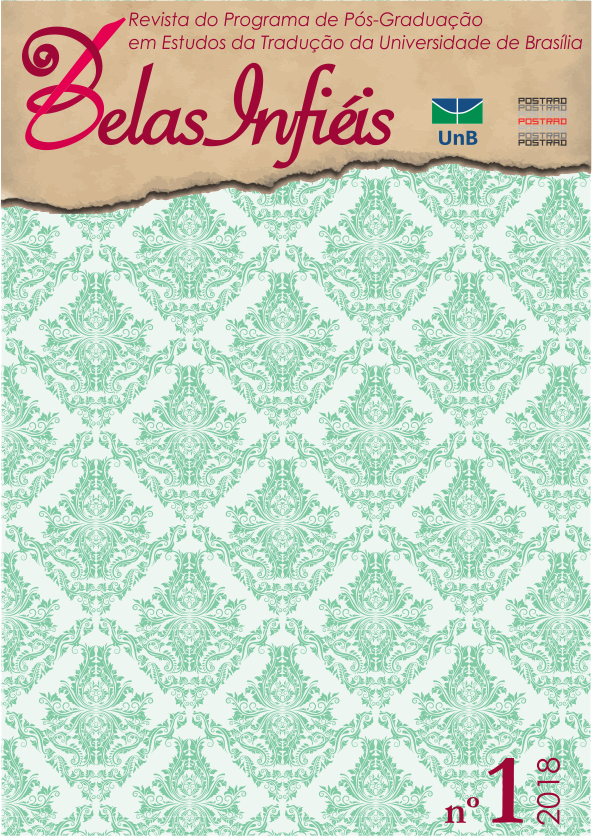Construção de um corpus paralelo para a elaboração de um glossário básico espanhol-inglês no âmbito do patrimônio
DOI:
https://doi.org/10.26512/belasinfieis.v7i1.12465Palabras clave:
Traducción especializada, Recursos para la traducción, Corpus paralelo, Glosario especializado, Patrimonio culturalResumen
Este artículo explora la elaboración de recursos de traducción en el ámbito del patrimonio cultural a partir de resúmenes académicos en español y en inglés publicados en Apuntes. Revista de estudios sobre patrimonio cultural. Los principios de lingüística de corpus aplicada a la traducción de Cabré (2007), Frérot (2016) y Fantinuoli (2016) fueron tomados en cuenta para guiar el trabajo metodológico y demostrar la utilidad de la formación y explotación de corpora textuales. Se exponen las acciones emprendidas y las herramientas utilizadas en la construcción de un corpus paralelo como punto de partida para la explotación de textos que resulta en la producción de un glosario especializado. Si bien, el estudio estuvo limitado por el tamaño relativamente reducido del corpus generado, los resultados permiten afirmar que los recursos tienen un impacto positivo y, sin duda, resultarán útiles en futuras traducciones dentro del mismo ámbito. Se concluye concordando con estudios previos similares al presente en el sentido de que se recomienda continuar con labores de creación y utilización de corpus para cubrir las necesidades del traductor en la comunicación especializada y el uso correcto de terminología y de colocaciones en diversas tipologías textuales.
Referencias
CABRÉ, M. T. Terminology: Theory, Methods and Applications. Philadelphia: John Benjamins, 1992.
CABRÉ, M. T. La terminología: Representación y comunicación. Barcelona: Universitat Pompeu Fabra, 1999.
CABRÉ, M. T. Construir un corpus de textos de especialidad: condiciones y posibilidades. En M. Ballard, & C. Pineira-Tresmontant, Les corpus en linguistique et en traductologie. Artois Presses Université, 2007.
CABRÉ, M. T. El principio de poliedricidad: la articulación de lo discursivo, lo cognitivo y lo lingüístico en terminología. Ibérica: Revista de la Asociación Europea de Lenguas para Fines Específicos(16), 2008, pp. 9-36.
D'EGIDIO, A. The Language of Tourists in English and Italian Travel Blogs and Trip Reports: a Corpus-based Analysis. Lingue Culture Mediazioni / Languages Cultures Mediation, 2014, pp. 145-157.
DOS SANTOS MOREIRA, A. C. A Translation-Oriented Tourism Term Bank. International Conference on Tourism & Management Studies. Book of Proceedings Vol II (pp. 1066-1068). Algarve: Universidade do Algarve, 2011.
DURÁN MUÑOZ, I. Caracterización de la traducción turística: problemas, dificultades y posibles soluciones. Revista de Lingüística y Lenguas Aplicadas, Vol 7, 2012, pp. 103-113.
FANTINUOLI, C. Revisiting Corpus Creation and Analysis Tools for Translation Tasks. Cadernos de Tradução. Vol 36. N.1, 2016, pp. 62-87.
FIJO LEÓN, M., & Fuentes Luque, A. A Corpus-based Approach to the Compilation, Analysis and Translation of Rural Tourism Terms. Meta, 58 (1), 2013, pp. 212-226.
FRÉROT, C. Corpora and Corpus Technology for Translation Purposes in Professional and Academic Environments. Major Achievements and New Perspectives. Cadernos de Tradução, Vol. 36, N. 1, 2016, pp. 36-61.
FUENTES LUQUE, A. La traducción en el sector turístico. Granada: Atrio, 2005.
ZANETTIN, F. Translation-Driven Corpora: Corpus Resources for Descriptive and Applied Translation Studies. New York: Routledge, 2012.
Descargas
Publicado
Número
Sección
Licencia
Copyright Statement
Given the public access to this journal, the texts are free to use but requires the recognition of the original authorship and initial publication in this journal to be properly stated.
The journal allows the use of works published for non-commercial purposes, including the right to submit the work to publicly accessible databases. Published contributions are the sole and exclusive responsibility of the author(s).
- When submitting papers to be evaluated by the Belas Infiéis journal, the author(s):
- Declare that the contents of the contributions are original and of their original creation, being entirely responsible for their content if there is an objection by third parties.
- Claim to be aware that they should not commit academic plagiarism.
- Declare that the manuscript has not been published, completely or partially, in Portuguese or another language. If it is a translation it should be submitted to the Translated Articles section.
- Declare that the manuscript is not being evaluated by other journals.
- Declare that the manuscript was not submitted to another journal simultaneously.
- Commit(s) to inform the journal of any kind of error or inaccuracy in their contribution (published, in evaluation or in editing) and to collaborate with the editors to make due corrections of the article (when in evaluation or editing) or erratum/retraction (after publication).
- Declare that there is no conflict of interest regarding the published work.
- Authorize its release if it is accepted for publication without any kind of monetary compensation.
- Agree to assign non-exclusive rights to publication to the magazine, remaining free to make their contribution available in other media as long as the publication of the first version in Belas Infiéis magazine is mentioned. They also authorize Belas Infiéis to assign their texts for reproduction in content indexers, virtual libraries and similar platforms.
- Maintain copyright and grant the journal the right of first publication, the work being licensed under theCreative Commons Attribution License.
- Is/Are allowed and encouraged to publish and distribute their work online after the editorial process, which may increase the impact and citation of the published work.
- Authorize the editorial team to make textual adjustments and to adapt the article to the publication rules, when necessary.



















